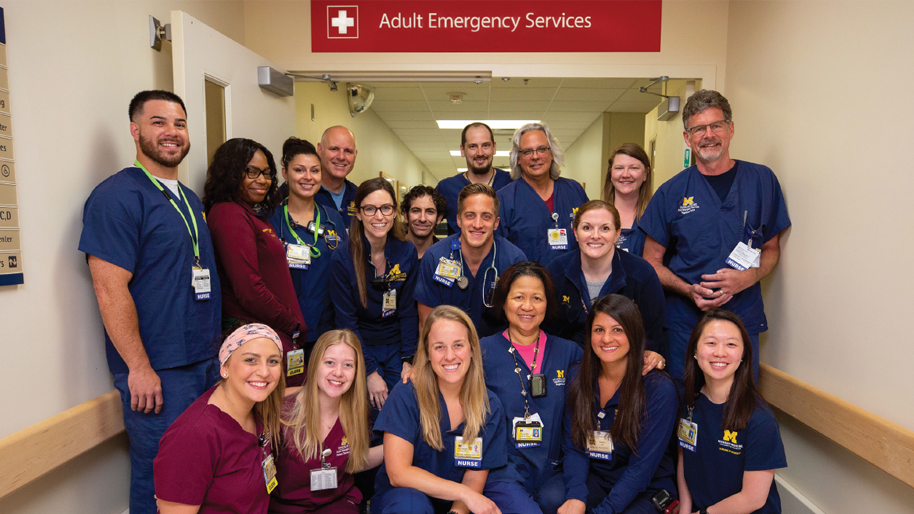Medical emergencies are stressful and often confusing. Our Emergency Department faculty and staff are committed to providing the highest quality and safest care possible. Click on a link below to go to that section:
What to Expect at the Michigan Medicine Emergency Department
A visit to the Emergency Department at Michigan Medicine will include several stages.

Triage
Our check-in clerk will ask several questions to open or create a medical record for you.
A triage nurse will ask more questions to determine how we should begin your care.
You will be taken to a triage bay for privacy where a nurse will talk with you about how you are feeling. A member of our team will also measure your temperature, heart rate, breathing rate, and blood pressure.
If a treatment area is not available when your nursing assessment is complete, we will direct you to a waiting area. To help speed up your visit, the triage nurse may begin one or more medical tests to get your treatment underway while you wait.
Some patients will be moved directly to a treatment area if their condition is extremely serious or if the patient has a condition that could spread to others in the waiting area.
Evaluation
A nurse will be assigned to provide care for you, coordinate efforts across your care team and keep you informed during your visit.
Your medical provider may recommend certain tests to help determine your condition. These may include blood or urine tests, an EKG to see how your heart is working, and special tests that create pictures of the inside of your body, such as an ultrasound, X-ray, CT scan or MRI.
Registration
Once you move to the treatment area, a registrar will meet with you to confirm your address, the name of your primary care doctor, your insurance information and your preferred pharmacy.
The registrar will prepare a consent form and request your signature allowing permission to treat you in the Emergency Department and to bill your insurance.
Discharge from the Emergency Department
When your evaluation is complete, your treatment team will review your test results, diagnosis, and any plans for follow-up care with you. You will receive a copy of discharge instructions before you leave. Talk to your nurse or medical provider about any questions or concerns you may have about your care or discharge instructions before you leave the Emergency Department. Let us know if you need a work or school note. When you are ready to leave, be sure to stop at checkout to complete any final paperwork and take care of payments or copays.
Hospitalization
Sometimes hospital care is required. We know this may be unexpected. Please let us know if we can assist you with phone calls or other ways to help you to prepare for your stay.
Michigan Medicine doctors care for patients at three local hospitals. Your care team may discuss options for your care that could include inpatient care or observation at:
- Michigan Medicine’s care units here on the University of Michigan campus
- The 10 East Medicine Unit at St. Joseph Mercy Ann Arbor, staffed by Michigan Medicine doctors
- St. Joseph Mercy Chelsea, jointly owned by both Saint Joseph Mercy Health System and University of Michigan Health
Your Emergency Department care team will ensure a smooth transition to the admitting team that will be caring for you.
We recommend that you send personal belongings home with friends or family. A member of our security team can help you secure any personal belongings that you are not able to send home.
Your Care Team

Our Emergency Department team members wear color-coded scrubs for easy identification.
- Gray: Emergency Department doctors and physician assistants
- Navy blue: Emergency Department nurses
- Olive green: Emergency Department techs
- Burgundy: Emergency Department unit hosts and clerks
- Beige: Emergency Department registrars
Your care team may also include social workers, pharmacists and respiratory therapists. Our Emergency Department medical team could also discuss your health with other Michigan Medicine specialty physicians.
Michigan Medicine is a teaching hospital, so medical students, residents, and fellows may be part of your care team. A board certified emergency medicine doctor closely supervises the care of each patient in the Emergency Department.
Throughout the process, your nurse will keep you informed and will answer questions and address your concerns.
Family and Visitor Policy
To protect the privacy and safety of all patients, visitation is limited to one or two visitors at a time, depending on patient location.
A visitor badge is required for entry into the treatment area and may be obtained from the guest services specialist in the waiting area.
A visitor center for family and friends is located in close proximity to the Emergency Department. Visitors may be asked to move to the visitor center to reserve waiting room space for patients. Large groups of family and visitors may be relocated to an alternate waiting area.
Frequently Asked Questions
Why does the triage nurse ask so many questions that don’t seem related to why I am here?
Why would someone who arrived after me be taken to the treatment area first?
I’m in the waiting area and feeling worse. Who should I tell?
What can I do while waiting to be taken to a treatment area?
Can I use the restroom?
How long do test results take?
Am I allowed to eat or drink anything while waiting for care?
What can I do if I’m having difficulty talking to or understanding my care team?
What takes so long while I’m waiting in the treatment area?
What is best way for family and friends to reach me?
When using the room phones, dial 97 for an outside line. Dial 0 to call the hospital operator for assistance with placing a long distance call.

